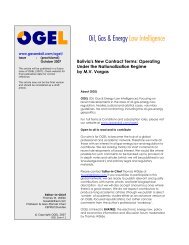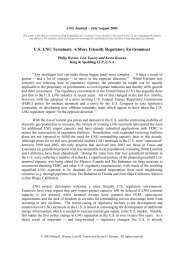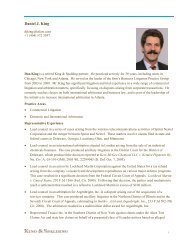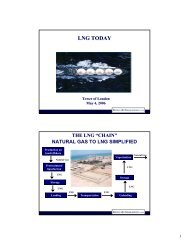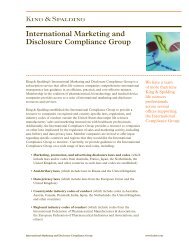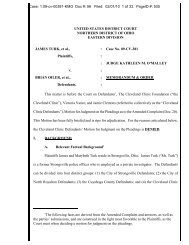Due Diligence Review: M&A Behind the Scenes - King & Spalding
Due Diligence Review: M&A Behind the Scenes - King & Spalding
Due Diligence Review: M&A Behind the Scenes - King & Spalding
Create successful ePaper yourself
Turn your PDF publications into a flip-book with our unique Google optimized e-Paper software.
FINANCIALduediligence<br />
Why Good <strong>Due</strong> <strong>Diligence</strong> Could<br />
Lead to Many More Deals Done<br />
BY MARTIN GODDARD<br />
During 2003, according to almost 60 percent of mid-market<br />
venture capitalists and brokers surveyed by Grant<br />
Thornton Corporate Finance, due diligence issues were<br />
highlighted as responsible for between 10 percent and 50 percent<br />
of collapsed deals.<br />
It is widely accepted that many M&A transactions fail to deliver<br />
<strong>the</strong>ir potential value because of over optimistic early stage<br />
evaluation of synergies, <strong>the</strong> inadequate resolution of cultural differences<br />
and skill gaps in management teams and a failure to<br />
achieve effective post deal implementation and integration.<br />
Providers of due diligence are aware of <strong>the</strong>se issues, however,<br />
perhaps a greater constraint is <strong>the</strong> reticence of some of those who<br />
instruct due diligence to permit its scope to be extended into<br />
<strong>the</strong>se key areas, in which institutions and corporates often presume<br />
<strong>the</strong>mselves to be self-sufficient.<br />
The involvement of experts in <strong>the</strong>se key areas cannot happen<br />
too early in a deal process and can have a profound impact on<br />
both <strong>the</strong> investment analysis and <strong>the</strong> critical path which ensues<br />
from it.<br />
Whilst due diligence frequently contributes to <strong>the</strong> shaping of<br />
deal structures, sometimes <strong>the</strong> most powerful message that can<br />
be given to a purchaser is an early warning that <strong>the</strong> deal is flawed<br />
and that <strong>the</strong> most effective course of action is withdrawal.<br />
Effective due diligence can often play a crucial role in achieving<br />
deal completion in challenging situations. A recently tough,<br />
but ultimately successful, BIMBO involving a fast turnaround<br />
saw due diligence as a pivotal component of <strong>the</strong> deal making<br />
process. Pre acquisition, <strong>the</strong> target group was losing approximately<br />
£1m a month, yet <strong>the</strong> management team believed that <strong>the</strong>y<br />
could bring <strong>the</strong> position back to break even within three months.<br />
Management had prepared a detailed action plan showing how<br />
<strong>the</strong>y would achieve this turnaround. The challenge faced by<br />
Grant Thornton's Transaction Services team was to be able to<br />
provide sufficient comfort on <strong>the</strong> assumptions to give <strong>the</strong> funders<br />
confidence in <strong>the</strong> plan.<br />
Completing <strong>the</strong> task required very focused financial diligence,<br />
completed in parallel with <strong>the</strong> o<strong>the</strong>r advisers as well as <strong>the</strong> management<br />
team itself. Working with <strong>the</strong> private equity house, <strong>the</strong><br />
team identified <strong>the</strong> key risks to <strong>the</strong> turnaround plan so that <strong>the</strong><br />
limited time available could be focused in <strong>the</strong>se areas.<br />
Communication and organisation were key to completing this<br />
task. In order to meet <strong>the</strong> timetable, Grant Thornton would hold<br />
regular meetings with <strong>the</strong> private equity house in order to report<br />
findings in real time and ensure that <strong>the</strong> whole team was aware<br />
of issues as <strong>the</strong>y arose.<br />
One such issue involved <strong>the</strong> preparation of a back up plan<br />
should <strong>the</strong> back-to-back sale of two non-core subsidiaries fail to<br />
complete. Our client did not want to take <strong>the</strong> risk of ending up<br />
funding <strong>the</strong>se two loss making subsidiaries should <strong>the</strong> sale not<br />
complete. Therefore we devised a contingency plan which would<br />
have involved placing <strong>the</strong>se companies into administration on<br />
completion. Fortunately plan A worked and <strong>the</strong> companies were<br />
sold on at completion.<br />
The bottom line is that many more deals could be made, whilst<br />
o<strong>the</strong>rs that are destined to failure would not even progress past<br />
initial stage, wasting precious time and resources, if only greater<br />
attention was paid to diligence issues. Management teams often<br />
get too embroiled in <strong>the</strong> actual deal, taking <strong>the</strong>ir eyes off <strong>the</strong> day<br />
to day management of <strong>the</strong> company, a mistake that can be costly,<br />
leading to diligence issues arising where previously <strong>the</strong>re weren't<br />
any. It is imperative for sellers to keep <strong>the</strong>ir house in order as a<br />
way of attracting potential buyers, many of whom will be<br />
deterred by <strong>the</strong> first signs of diligence problems. As for buyers, it<br />
is not always advisable to pay handsome prices to secure exclusivity<br />
as often this could set <strong>the</strong>m up for a prolonged and tortuous<br />
deal process.<br />
A growing number of deals in <strong>the</strong> US are adopting a different<br />
approach. Buyers will already factor into <strong>the</strong>ir offers possible<br />
diligence issues as a way of ensuring greater certainty to all<br />
involved in <strong>the</strong> deal. This approach is particularly welcome at<br />
times when business confidence is not high and is a strategy that<br />
is beginning to bear fruit with some encouraging signs of more<br />
done deals as a result of less uncertainty.<br />
Martin Goddard is Head of Transaction Services at Grant Thornton<br />
Corporate Finance.<br />
10 FW <strong>Due</strong> <strong>Diligence</strong> <strong>Review</strong>: M&A <strong>Behind</strong> <strong>the</strong> <strong>Scenes</strong> 2004 | www.financierworldwide.com







